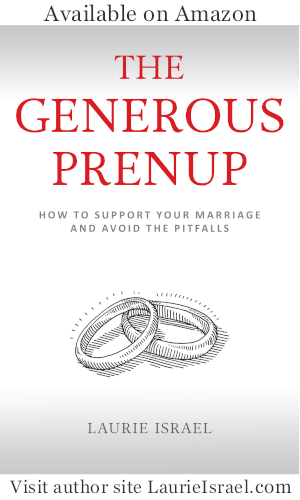There have been many articles on The Huffington Post and elsewhere touting the benefits of prenuptial agreements, such as, “Why Engaged Couples Should Sign a Prenup.”

These articles typically talk about how resolving and clarifying money issues prior to marriage is a good thing. However, they do not take into account the very important component of most good marriages: the sharing of money and resources. So prenups aren’t necessarily the best thing since sliced bread — they can pose many problems for the future spouses.
Why have a prenup?
There are circumstances where prenuptial agreements address bona fide issues that could derail a marriage. For instance, it may be a second marriage for one or both of the spouses, with children from a first marriage. In these cases, a carefully drafted prenuptial agreement can reduce financial tensions in the marriage and make the marriage better. Or a family with money may insist that their child have a prenup. The future spouses may comply in order to create family peace.
But prenups can overdo it, too. They often go far beyond what is necessary to accomplish narrow goals. And because money and finances are one of the central aspects of marriage, overdrawn prenups can cripple a marriage before it even begins. The old saying “Money is love,” has much truth to it. Although in our culture we marry for love, one of the expressions of love is providing financial security for the beloved. Therefore, prenups tend to signify a withdrawal of love right at the outset.
What happens when you “lawyer up” in a prenup?
The other big problem of premarital agreements is the process in which it is usually done. At a very tender and loving time in their relationship, the parties “lawyer up.” They are now transformed into adversaries.
Imagine this scenario — it happens all the time. The future spouses are in love. The wedding date has been set. Arrangements have been made, and the invitations may have been sent. The couple briefly discussed a prenup earlier but hadn’t really talked about the terms.
Then one of the parties, generally the more-moneyed spouse, hires a lawyer. That lawyer draws up the first draft of the prenup. The initiating spouse may not have discussed the issues he wanted to address in the prenup and what terms he wanted with his own lawyer. He just asked for a “prenup” and got one.

Here comes the “scorched-earth” prenup.
Generally the more-moneyed spouse’s attorney sends a typical “off-the-shelf” prenup. It says that all money earned during the marriage is the husband’s to control. All property accumulated before the marriage and proceeds and gains on it are also his to control. And the husband can decide whether or not to leave his new wife anything if he dies while the marriage is ongoing, even if they’ve been married 30 years. And she has no legal rights remaining to contest any of these terms.
And, by the way, the prenup says that there is no alimony, ever. Even if she leaves the job market and becomes a stay-at-home spouse with children and the marriage is very long, there is no alimony. I call this the “scorched-earth” version. This becomes the first salvo in the prenup war.
The less-moneyed spouse is asked to get a lawyer, and her lawyer receives the draft. The lawyer then has to break the bad news to his client. She is devastated that her fiancé would be so mean. Their relationship may never heal from this initial blow.
I see this type of prenup very frequently when I am asked to review prenups on behalf of a client – even in the case of first marriages for both parties.
Hurt feelings.
As soon as the less-moneyed spouse understands what’s in the prenup, her feelings are understandably hurt. Very badly. She wonders who was behind this draft, her fiancé or her fiancé’s attorney? Why would her future husband want to withhold property from her? Why should he control everything? Why can’t they have a joint venture in at least part of their marriage? Why wouldn’t he want to leave her his assets if he dies at a time the marriage is ongoing? Why not, indeed?
She wonders what happened to the love they had. She wonders why her fiancé wants to put her in a bad position. She wonders why would he want to be unfair to her.
The future husband feels like a cad. And yet, he trusts his lawyer. The lawyer might be his business lawyer and has always given him good advice. Changing the prenup becomes a difficult, uphill battle. His attorney resists change and says, “This is just a business deal,” or “This will just go into a drawer and be pulled out if it’s needed later,” or “This is what a prenup is.”
Negotiations.
What proceeds is a series of fairly ugly negotiations through the two attorneys. The attorneys speak to each other and with their respective clients. The future spouses are very uncomfortable because they are now adversaries in a legal process. What started out as two people loving each other and wanting to marry has morphed into something else. The less-moneyed spouse feels she cannot share what is happening to her family, because their feelings towards her fiancé will change. She is dealing with it, and feels totally isolated. There are always tears shed.
Exhaustion sets in.
The parties become exhausted with the struggle. They just want to get it over with. The wedding is approaching. They know the prenuptial agreement is flawed, but they sign it. It will be the economic guideline for their marriage.
However, the anger and hurt generated by this process will always be remembered, and can weaken the marriage at the outset, even if the prenup gradually changes and becomes more balanced and narrowly drawn. The prenup may even make divorce more likely. Perhaps much more likely depending on what the prenup says and how bad the process of negotiation was.
—
In my upcoming piece, “Prenups – Don’t Laywer Up, Mediate! Part II: The Solution,” you’ll read about some of the steps to a mediated prenup, and how mediation can provide great advantages to the future spouses.
© Laurie Israel 2011.